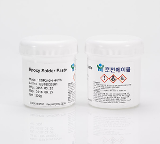Epoxy Solder Paste
- Low Reflow Temperature
Introduction
With the simplification of manufacturing process and high reliability in chip or package bonding, epoxy solder paste (ESP) has been increasingly considered as a competitive bonding material. The ESP material comprised solder powder and epoxy formulation which can remove oxide layers on the surface of solder powder and pad finish metal. The bonding formed using ESP shows outstanding bonding strength and suppresses electrical short between adjacent pads or leads owing to the reinforced structure by cured epoxy after the bonding. ESP is also expected to suppress the formation and growth of whisker on the pads or leads. With these advantages, ESP is becoming a spotlighted bonding material in the assembly of flexible electronics and electronic modules in automotive vehicles.

The ESP180N Series is a low-temperature epoxy solder paste that can be applied through SMT process and obtain excellent results under low-temperature reflow conditions.
Application
Features and Advantages


Product Information
Physical Properties
| Spec | Unit | Value |
|---|---|---|
| Color | - | Gray |
| Specific Gravity | - | 8.7 |
| Thixotropic Index (TI) | - | 0.4~0.7 |
| Viscosity @25C | Pa.S | LV(40~80) MV(80~140) HV(140~230) |
| Tg | C | 72 |
| Thermal Conductivity | W/mK | 40 |
| Bending Test | - | 10,000pass |
| SIR | Ohm | >1.0x10E9 |
| Reflow Condition | - | Refer to reflow profile |